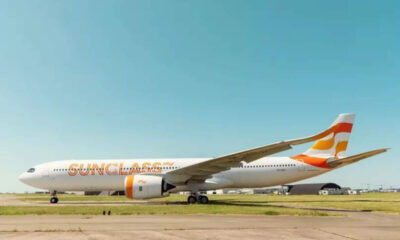Tech News
Scottish universities lead digital twin hub for transport

Heriot-Watt University and the University of Glasgow are collaborating on a £46m project aimed at researching the use of digital twins to decarbonise the UK’s transport systems.
The initiative, funded by the UKRI Engineering and Physical Sciences Research Council (EPSRC) along with £26m investment from 67 partners, has established a new research hub named TransiT Hub. This hub focuses on utilizing digital twins to analyze and understand how various transport systems, including road, rail, air, and maritime, can be made more sustainable. Additionally, the hub will engage with passenger groups to incorporate human travel behavior and choices into their models.
Professor Phil Greening, joint director of TransiT and a faculty member at Heriot-Watt University, emphasized the importance of conducting experiments digitally in order to meet carbon reduction targets. He stated, “We need to design the future transport system and optimize the transition to it.”
Professor David Flynn, joint director of TransiT and a faculty member at the University of Glasgow, highlighted the challenge designers and engineers face in understanding the perspectives of individuals with mobility challenges. He mentioned the need to create and implement new design principles to identify equitable pathways to decarbonization.
The collaboration between the universities and various industry partners, such as transport operators, regulators, vehicle manufacturers, technology firms, and energy suppliers, is considered to be one of the largest transport consortiums in the UK. Transport minister Mike Kane praised the potential of digital twinning technology to integrate transport networks, enhance efficiency, and promote greener transportation.
The digital twins developed by TransiT will gather real-time data through sensors integrated into road, railway, and shipping infrastructure. This data, provided by industry partners, will include information on vehicles, fuel types, load sizes, route lengths, and frequencies.
The collected data will be analyzed to test different scenarios and improve them through digital twins, allowing for near real-time changes to be implemented in the physical world. For instance, updating digital road signs with real-time information on the quickest route out of traffic congestion could help reduce carbon emissions.
In addition to addressing current transport challenges, TransiT plans to explore the functionality of electric road systems and alternative fuels within a future decarbonized transport system.
Feryal Clark, minister for artificial intelligence and digital government, expressed support for cutting-edge innovations like those being pursued by TransiT, which aim to enhance the lives of British citizens through technology.
TransiT aims to establish a framework for other sectors to undergo transformative changes using digital twins, enabling policymakers to assess the outcomes of decisions across a wide range of scenarios.
Charlotte Deane, executive chair of EPSRC, highlighted the potential of digital twins to accelerate the decarbonization of transport networks by enabling quicker testing of potential changes, reducing costs, and facilitating the design of necessary transport infrastructure.
-

 Destination8 months ago
Destination8 months agoSingapore Airlines CEO set to join board of Air India, BA News, BA
-

 Breaking News10 months ago
Breaking News10 months agoCroatia to reintroduce compulsory military draft as regional tensions soar
-

 Gadgets4 months ago
Gadgets4 months agoSupernatural Season 16 Revival News, Cast, Plot and Release Date
-

 Tech News1 year ago
Tech News1 year agoBangladeshi police agents accused of selling citizens’ personal information on Telegram
-

 Productivity12 months ago
Productivity12 months agoHow Your Contact Center Can Become A Customer Engagement Center
-

 Gadgets4 weeks ago
Gadgets4 weeks agoFallout Season 2 Potential Release Date, Cast, Plot and News
-

 Breaking News10 months ago
Breaking News10 months agoBangladesh crisis: Refaat Ahmed sworn in as Bangladesh’s new chief justice
-

 Toys12 months ago
Toys12 months ago15 of the Best Trike & Tricycles Mums Recommend























